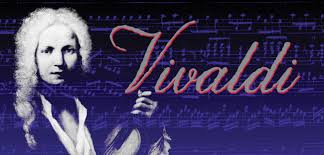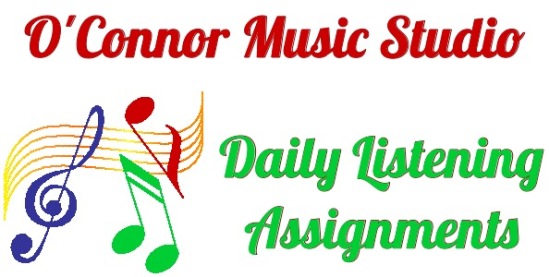
March Forth is also known as Marching Music Day. Find out more at https://www.maryo.co/march-forth-fourth/
Today is also National Grammar Day.
. 1678 ~ Antonio Lucio Vivaldi, Italian Baroque composer. The creator of hundreds of spirited, extroverted instrumental works, Vivaldi is widely recognized as the master of the Baroque instrumental concerto, which he perfected and popularized perhaps more than any of his contemporaries. A group of four violin concerti from Vivaldi’s Op. 8, better known as “The Four Seasons”, may well be the most universally recognizable musical work from the Baroque period. Perhaps the most prolific of all the great European composers, he once boasted that he could compose a concerto faster than a copyist could ready the individual parts for the players in the orchestra.
More information about Vivaldi
(MaryO’Note: Spring from The Four Seasons is available in the Piano Maestro App for piano students)
. 1801 ~ The U.S. Marine Band performed for the first time at a presidential nomination. That president was Thomas Jefferson.
. 1839 ~ Ignace Antoine Ladurner, pianist/composer, died at the age of 72
. 1875 ~ Bizet’s Carmen premier, Paris
. 1877 ~ The ballet of Swan Lake, composed by Peter Ilyich Tchaikovsky, was performed for the first time in the famous Bolshoi Theatre in Moscow, Russia
and
. 1915 ~ Carlos Surinac, Catalan Spanish-born composer and conductor
. 1918 ~ Frank Wigglesworth, American composer
. 1925 ~ Enzo Stuarti, Opera singer
. 1928 ~ Samuel Adler, German-born American composer
. 1929 ~ Bernard Haitink, Dutch conductor
. 1932 ~ Miriam (Zensile) Makeba, South African born singer who was the first black South African to attain international stardom.
. 1934 ~ Barbara McNair, Singer, TV hostess of The Barbara McNair Show, actress
. 1942 ~ Dick Jurgen’s orchestra recorded One Dozen Roses on Okeh Records in Chicago.
. 1942 ~ The Stage Door Canteen opened on West 44th Street in New York City. The canteen became widely known as a service club for men in the armed forces and a much-welcomed place to spend what would otherwise have been lonely hours. The USO, the United Service Organization, grew out of the ‘canteen’ operation, to provide entertainment for American troops around the world.
. 1943 ~ Irving Berlin picked up the Best Song Oscar for a little ditty he had written for the film, Holiday Inn: White Christmas at the 15th Academy Awards.
. 1944 ~ Bobby Womack, Songwriter, singer
. 1948 ~ Chris Squire, Bass with Yes
. 1948 ~ Shakin’ Stevens (Michael Barratt), Singer, actor
. 1951 ~ Chris Rea, Guitarist with these groups Chris Rea Band and Ambrosia; singer, songwriter
. 1969 ~ Chastity Bono, Singer, daughter of Sonny & Cher
. 1978 ~ Andy Gibb reached the top of the music charts as (Love is) Thicker Than Water reached #1 for a two-week stay. The Bee Gees also set a record on this day as their single, How Deep Is Your Love, from the Saturday Night Fever soundtrack stayed in the top 10 for an unprecedented 17 weeks.
. 1981 ~ Lyricist E.Y. ‘Yip’ Harburg died in an auto accident in Hollywood, CA at the age of 82. Two of his most successful hits were Over the Rainbow from The Wizard of Oz and It’s Only a Paper Moon, popularized by Nat King Cole and many others.
. 2001 ~ Glenn Hughes, a singer who performed as the mustachioed, leather-clad biker in the disco band the Village People, died at the age of 50. The group, which was the brainchild of producer Jacques Morali, featured men dressed as an Indian, a soldier, a construction worker, a police officer, a cowboy and Hughes’ character, a biker. The band released its first single, San Francisco (You’ve Got Me), in 1977. It followed the next year with its first hit, Macho Man. The band then produced a string of hits, including Y.M.C.A., In the Navy and Go West. Collectively the Village People sold 65 million albums and singles. Although disco fell out of fashion in the 1980s, Hughes stayed with the band until 1996, when he left to sing in Manhattan cabarets.
. 2003 ~ Fedora Barbieri, a mezzo-soprano whose passionate singing sometimes stole the scene from opera diva Maria Callas, died. She was 82. Born in Trieste in 1920, Barbieri performed on stages ranging from Milan’s La Scala to New York’s Metropolitan Opera House to London’s Covent Garden. Barbieri’s career started in 1940 and for her 80th birthday, she sang the role of Mamma Lucia in Pietro Mascagni’s “Cavalleria Rusticana” in Florence. Her repertoire included roles in operas by Giuseppe Verdi and Giacomo Puccini. Barbieri died in Florence, which she had adopted as her home and where she gave many performances.
. 2003 ~ Emilio Estefan Sr., father of the Latin music mogul, died at the age of 83. Estefan Sr. played the plump and comical ambassador in a music video for the Miami Sound Machine’s hit song Conga, which featured singer Gloria Estefan, wife of Estefan Jr. The Miami Sound Machine’s office was once located in Estefan Sr.’s garage. His son later built a home for his parents on his Star Island compound. Estefan Sr. was born in Santiago de Cuba and moved to Spain with Estefan Jr. in 1966. His wife and another son stayed in Cuba because the boy was of military draft age and couldn’t leave until 1980. Estefan Sr. came to Miami in 1968, a year after Estefan Jr., and opened a clothing business in Hialeah.
. 2009 ~ Joseph Bloch died. He was an American concert pianist and professor of piano literature at the Juilliard School in New York City. During a career at Juilliard that spanned five decades, Bloch’s students included Emanuel Ax, Van Cliburn, Misha Dichter, Garrick Ohlsson, Jeffrey Siegel and Jeffrey Swann.
. 2011 ~ Johnny Preston, American pop singer (Running Bear), died at the age of 71




